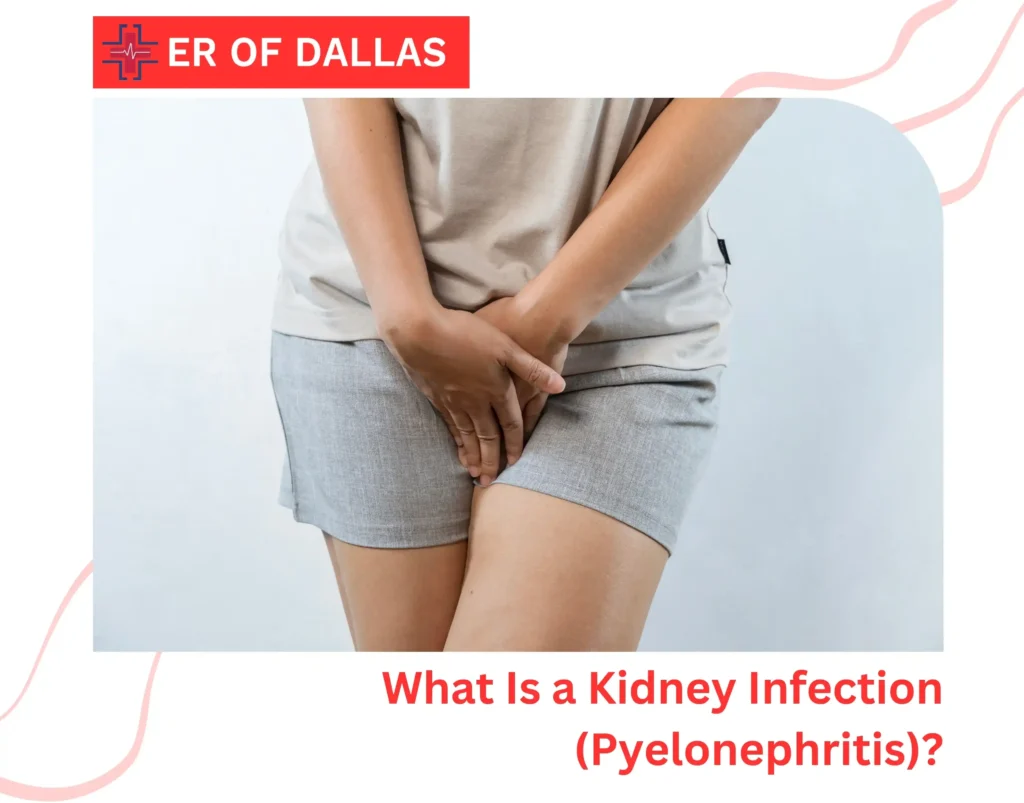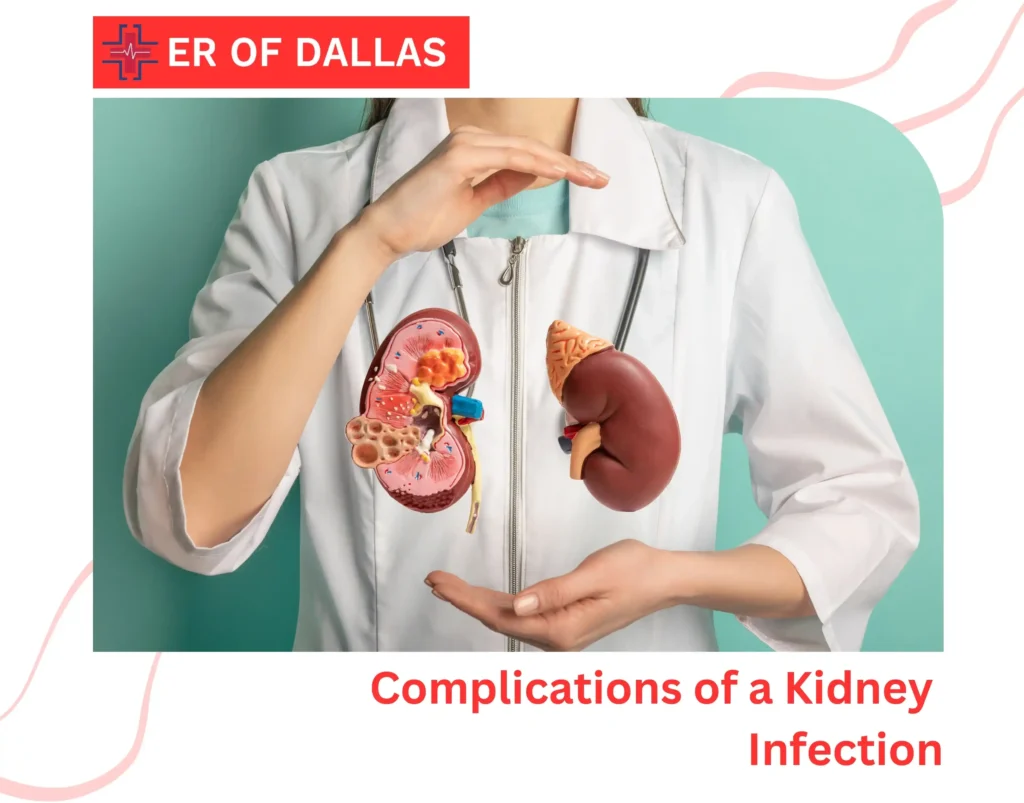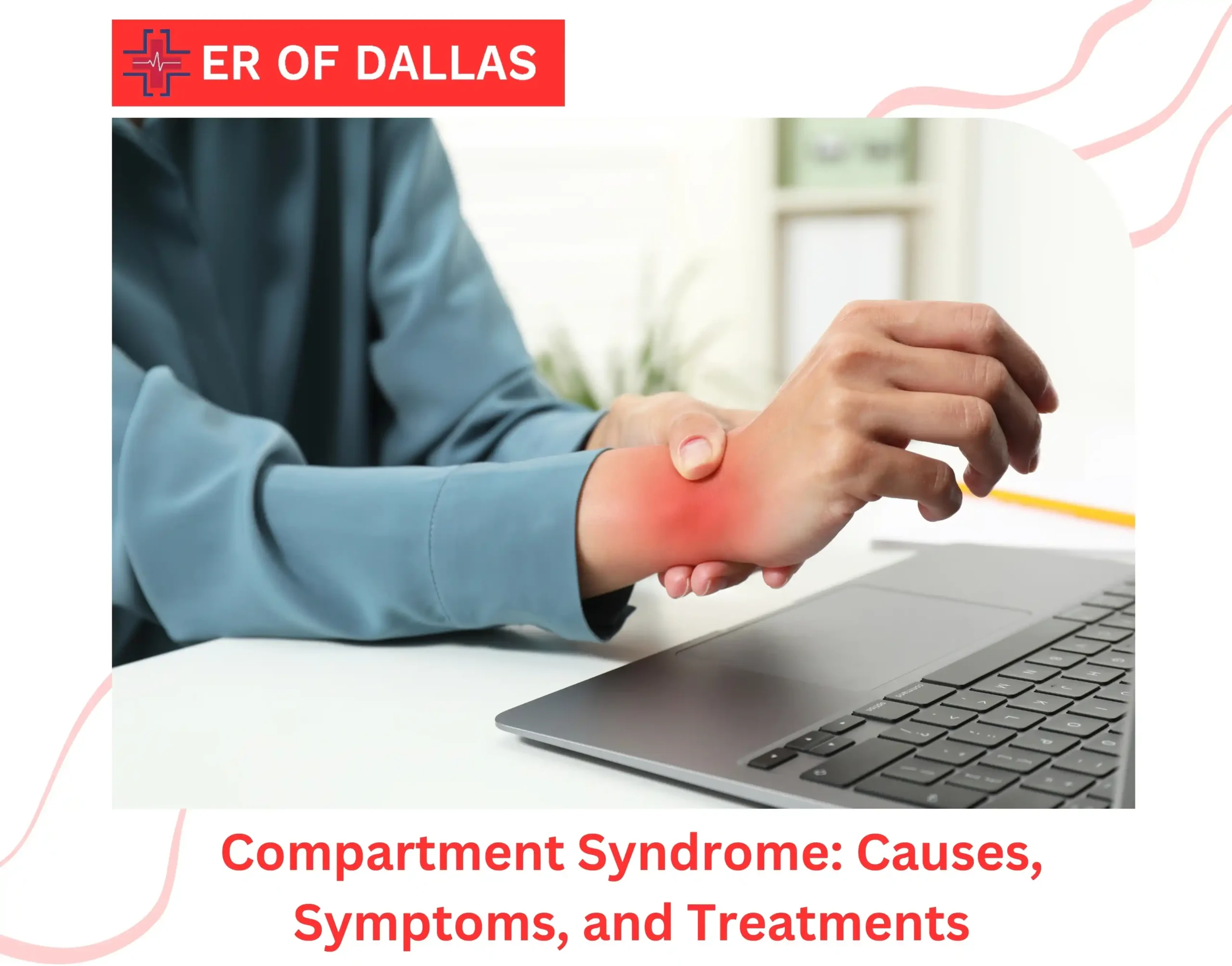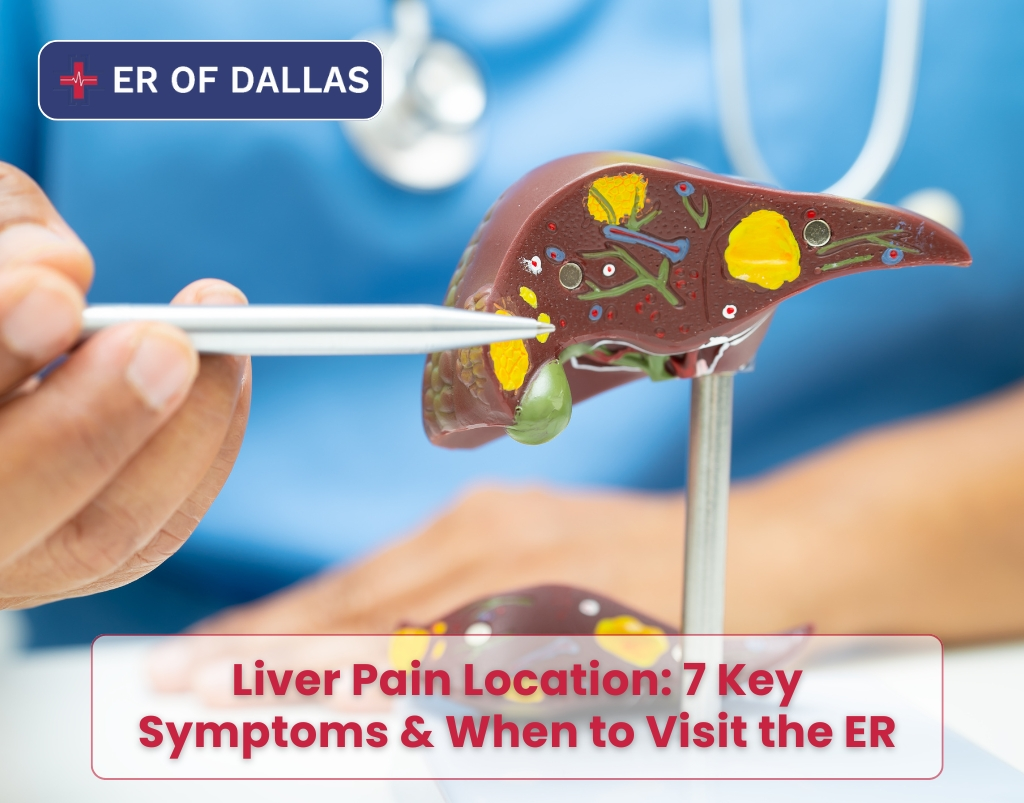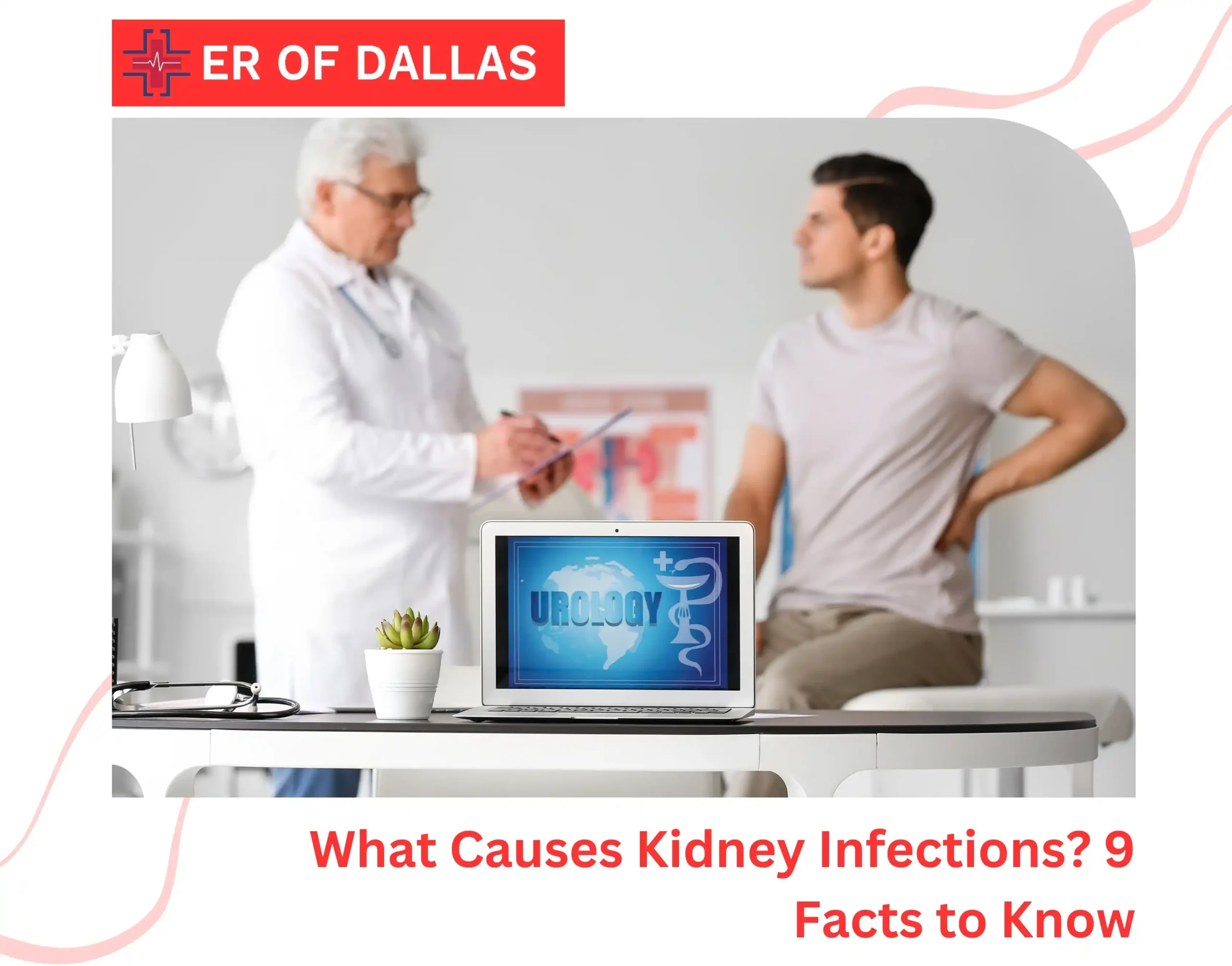That sharp pain in your lower back and burning sensation when urinating might seem like a typical UTI. But these symptoms could also signal a kidney infection, which is a far more serious condition. While UTIs affect your bladder, kidney infections can lead to permanent organ damage and life-threatening sepsis if not treated promptly.
So, how can you tell if it’s just a UTI or something more serious? Let’s break down how the two are connected and the key signs of a kidney infection. If you have frequent UTIs, this is a must-read. Know the signs of a kidney infection and when to go to the ER before it causes kidney damage.
What Is a Kidney Infection (Pyelonephritis)?
If a urinary tract infection isn’t treated completely, bacteria – most commonly E. coli from your digestive system – travel upwards through the ureters. These are tubes that connect your bladder to your kidneys. Once bacteria reach the kidneys, they multiply and cause inflammation, swelling, and pain, known as kidney infection or pyelonephritis.
The kidneys act as your body’s essential filtration system. Every day, they process about 150 quarts of blood, removing waste and excess fluids that become urine.
When infection disrupts this delicate system, toxins can build up in your body. Worse still, the infection can breach your kidneys’ natural barriers and spread into your bloodstream, potentially leading to sepsis, a life-threatening condition that requires immediate emergency care.
Causes of a Kidney Infection
While untreated UTIs are the most common trigger, several other conditions can increase your risk of developing a kidney infection:
- Vesicoureteral Reflux (VUR): Also known as bladder reverse flow, occurs when urine flows backward from the bladder into the ureters and sometimes the kidneys. VUR can be present from birth or develop later in life.
- Kidney Stones: These mineral deposits can block your urinary tract, trapping bacteria and allowing them to multiply. Even small stones can create enough obstruction to trigger an infection.
- Diabetes: High blood sugar levels can weaken your immune system and damage nerves that signal bladder emptying. This makes it easier for bacteria to grow and affects the body’s ability to fight infection.
- Weakened Immune System: Conditions like HIV, chemotherapy treatment, or medications that suppress your immune system make it harder for your body to fight off urinary tract bacteria.
- Use of Catheter: These medical devices, while necessary in some cases, can introduce bacteria directly into your urinary tract. This is why we closely monitor catheterized patients for signs of infection.
- Other Medical Conditions: Less common causes include recent kidney surgery, infected heart valves (endocarditis), or artificial joints that can become sources of bacteria.
Complications of a Kidney Infection
Here’s what happens when a kidney infection is not treated timely and spreads further.
Kidney Scarring
The inflammation due to a kidney infection can harm the tissue and scars may form. Scarring reduces the kidneys’ ability to filter waste and excess fluids from the blood. Over time, this can lead to:
- Toxins Build-up: Your blood becomes increasingly contaminated with waste products your kidneys can’t filter out
- High Blood Pressure: Infected kidneys struggle to balance fluid and hormones, both of which are crucial for maintaining normal blood pressure. This results in renal hypertension where the kidneys contribute to high blood pressure.
- Protein Loss: Scarring can cause proteins to leak into the urine (proteinuria), which harms kidney function.
Chronic Kidney Disease (CKD)
If scarring continues, the kidney function declines over time, and the condition is called chronic kidney disease. CKD has no cure, but dialysis keeps the kidneys working. Untreated CKD causes kidney failure.
Dehydration
The kidneys respond to the inflammation by producing more urine, which leads to dehydration.
Blood poisoning (Sepsis)
Bacteria from the kidney can spread into the bloodstream, it can cause sepsis, a fatal condition where the body has an extreme response to infection.
Kidney Abscesses
If a kidney infection isn’t treated fully, pockets of pus (renal abscess or kidney abscess) can form in the kidneys. These can rupture and spread the infection further.
9 Key Signs of A Kidney Infection (Pyelonephritis)
These signs will help you identify a kidney infection early and protect you from complications through timely treatment.
1. High Fever
A mild fever is a sign of UTI, but if your temperature shoots up to 101°F or higher, it could be a kidney infection.
2. Chills & Sweating
Chills and sweating also accompany fever. You are freezing one minute and sweating the next.
3. Severe Pain in the Back or Side
Discomfort in the lower abdomen or bladder area is common with a UTI. But if you feel like your back is killing you, it is a sign of kidney infection.
4. Nausea & Vomiting
If your stomach is queasy or you’re throwing up, that’s another big warning sign. It means your body is struggling to fight the infection. If you can’t keep food or water down, it’s time to head to the ER.
5. Confusion
When the kidneys don’t work properly, toxins build up in the blood and start affecting your brain. This can cause confusion, disorientation, and trouble concentrating. This sign is common in older adults.
6. Painful Urination
Like UTI, a kidney infection makes urination painful, frequent, or difficult. But in the case of a kidney infection, this sensation is much more severe. Some people explain it as feeling like fire when they pee.
7. Blood in Urine
Seeing blood in your urine (pink or cola-colored urine) is a sign of severe kidney infection.
8. Rapid Heart Rate
A rapid heart rate and low blood pressure mean your body is struggling to maintain circulation, which can lead to sepsis. If your heart is beating super fast or you feel dizzy when standing up, get to the ER asap.
9. Extreme Fatigue
Fatigue is common with infections. But if you feel so drained that you can barely move, it means the infection is overwhelming your body. This isn’t something you can just sleep off. You need immediate medical care.
What Happens at the ER for a Kidney Infection?
If you go to the ER with a kidney infection, the doctors will act fast to stop the infection from getting worse. Here’s what you can expect:
Medical Evaluation
The doctor will ask about your symptoms and medical history. They’ll also check your temperature, heart rate, and blood pressure.
Tests to Confirm Infection
- Urine test: A urine test can check for bacteria, blood, or pus in your urine.
- Urine Culture: A urine culture finds out what type of bacteria is causing the infection.
- Blood Tests: Blood tests check if the infection has spread to your bloodstream.
- Diagnostic Imaging: If the doctor suspects kidney stones, blockages, or complications, they may order a CT scan, ultrasound, or X-ray to check your kidneys.
IV Antibiotics & Fluids
Since kidney infections can be serious, you’ll likely get IV antibiotics right away. These work faster than pills and help fight the infection. If you’re dehydrated or vomiting, IV fluids keep your body stable.
Pain Management
If you’re in severe pain, the ER team will give you medication to help you feel comfortable.
Hospital Admission
Most people can go home after receiving IV antibiotics, but you may need to stay in the hospital if:
- Infection is severe
- You’re not responding to treatment
- You’re pregnant
- Have other health conditions that put you at risk
- You develop complications like sepsis
If your symptoms don’t improve or get worse after leaving the ER, go back immediately.
Final Thoughts
If you are showing even one sign of a kidney infection, get to ER Dallas. Catching it early can save you serious complications and a longer recovery. First off, never leave your UTI untreated, especially if it keeps coming back.
Treating a UTI early can stop it from turning into a kidney infection. Drink plenty of water, practice good hygiene, and count on ER Dallas to help you recover fast.
FAQs
1. How long does it take to recover from a kidney infection?
A kidney infection usually takes about two weeks to fully recover. The recovery time depends on how severe the infection is and individual health factors. Some people start feeling better in a few days. Even if you do, don’t stop taking your medicine. Finish the entire course to ensure the infection is completely eradicated.
2. What to avoid with a kidney infection?
When dealing with a kidney infection, you should avoid spicy foods, acidic fruits like citrus, and tomatoes, excessive caffeine, alcohol, and carbonated beverages.
3. Can a kidney infection be treated?
A kidney infection is treatable, and most people recover completely. However, it’s important to finish the entire course of antibiotics to prevent the infection from returning.


